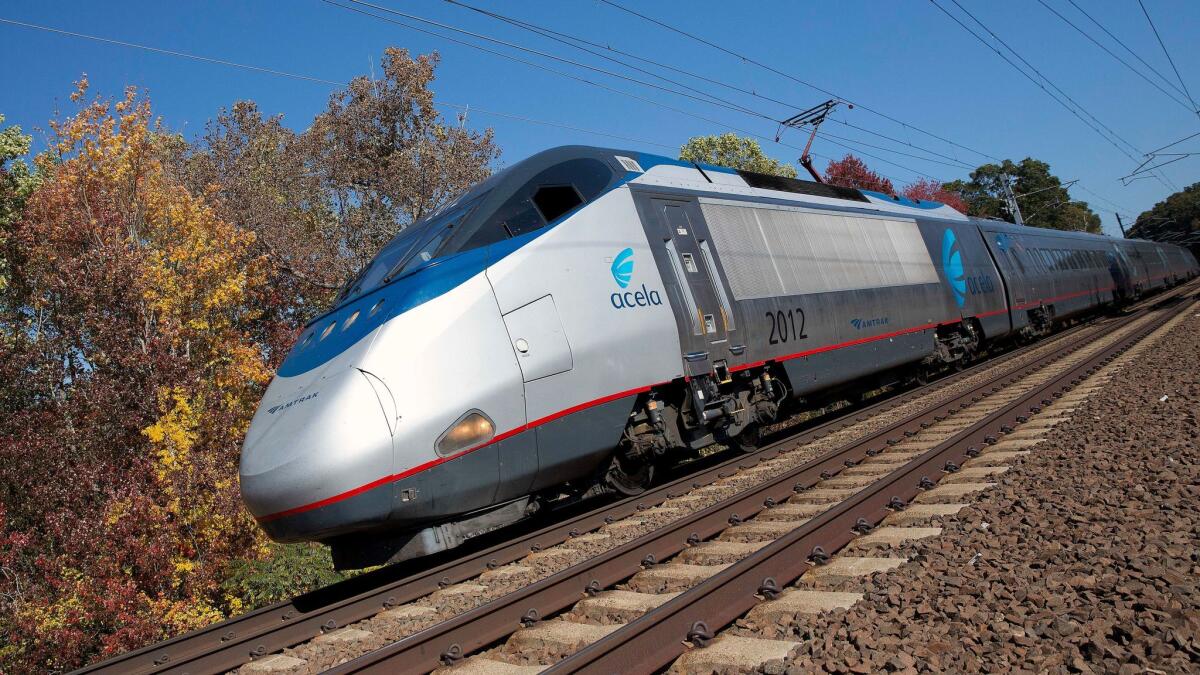Editorial: Build America, then Buy American

When President Obama signed the stimulus spending package in 2009 in an effort to revive the recession-slowed economy, high-speed rail projects were a big winner. Congress appropriated $10 billion to build new bullet train corridors and to upgrade existing rail lines to accommodate faster trains. The goal was to build a modern, energy-efficient rail system that would alleviate pressure on highways and airports, while also creating jobs for people constructing the lines and manufacturing the trains.
Job creation was so critical to the program that federal lawmakers not only included existing Buy American Act mandates in the law, they boosted them, requiring that 100% of the components of the train systems be built in the U.S. to help spur the creation of a domestic manufacturing industry.
But now the California High Speed Rail Authority, which received the single largest grant from the high-speed rail funding program, has asked the Federal Railroad Administration to exempt the bullet train from the Buy American Act. The authority argues that to ensure the safety and reliability of the trains, the agency needs to be able to build certain train parts — including the wheels, brakes, derailment mitigation devices, undercarriages, motors and even the car body shells — in established manufacturing facilities with experienced personnel, none of which currently exists in the U.S.
Of course, such a request undermines the purpose of the stimulus package. It also whittles away at one of biggest selling points of the high speed rail project — that it will create quality jobs and lasting economic benefit.
And yet some kind of waiver may be necessary. For now. Obama’s plan to build a high speed rail network has stalled. The Republican-controlled Congress has expressed little interest in continuing to fund new high-speed rail corridors, and has declared its outright opposition to California’s project. Republican governors in Wisconsin and Ohio have canceled planned projects in their states, saying they would be too expensive. Both states returned the federal stimulus funding.
In other words, there’s no pipeline of projects moving forward to fuel a domestic rail car manufacturing industry. The major makers of high-speed rail systems are all foreign-based, and none is currently build high-speed rail trains in the U.S. Last year the Federal Railroad Administration granted a Buy American Act waiver to Amtrak so it could buy 28 multi-car trains from France-based Alstom after the agency warned it could take two years and add $2 million to the cost of each train set to establish a U.S. production facility. So Alstom will make the car shells, brakes and several other components abroad and assemble the trains, capable of traveling 186 miles per hour, in New York. The California High Speed Rail Authority has modeled its request on Amtrak’s.
The reality is that the “Buy American” requirements won’t drive the creation of permanent jobs in the rail manufacturing industry. Nor will one high-speed rail project alone. Sustained funding and investment in rail infrastructure — both high-speed and commuter rail — will. On election day, voters approved nearly $200 billion of local ballot measures for public transit projects, showing there is still a tremendous desire to invest in modern transportation systems. President-elect Donald Trump has talked about rebuilding the country’s infrastructure; he has railed against the nation’s sluggish rail lines and has praised China’s high-speed systems. Will that translate into a renewed vision for high-speed rail that will support permanent jobs? Let’s hope so.
In the meantime, if the authority is granted a waiver, it should still aim to generate the maximum number of jobs in the United States. Advocates have been pushing the authority to give greater consideration during the bidding process to manufacturers that promise to create the most high quality jobs in the U.S. That’s a sensible compromise.
Follow the Opinion section on Twitter @latimesopinion and Facebook
More to Read
A cure for the common opinion
Get thought-provoking perspectives with our weekly newsletter.
You may occasionally receive promotional content from the Los Angeles Times.





